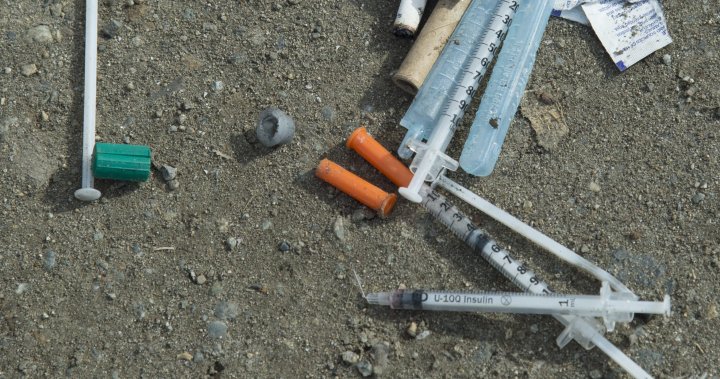Drug decriminalization unlikely to be pursued by most provinces despite B.C. approval | Globalnews.ca
British Columbia’s request to decriminalize personal possession of some illicit drugs is unlikely to be replicated by other provinces and territories or on the national level — at least not right away.
Provincial ministers who reacted publicly to Tuesday’s approval of decriminalization by the federal government, as well as provinces and territories who responded to Global News, indicated they are in no rush to follow B.C.’s lead or are not even considering such a request.
Read more:
B.C. becomes first province to remove criminal penalties for possession of some hard drugs
Meanwhile, Carolyn Bennett, the federal minister of mental health and addictions, said Tuesday she will not vote for a private member’s bill introduced by New Democrat MP Gord Johns to decriminalize possession of small amounts of drugs across the country.
“I have some discomfort with the bill, because I think it doesn’t put in place the guardrails around implementation,” she told reporters.
“It has been an important bill, but I think that starting with British Columbia is a prudent way to go.”
Johns, who represents a riding on Vancouver Island and serves as his party’s mental health critic, said in a statement that the decision to approve B.C.’s request “will leave Canadians living outside that province asking themselves, ‘If this is okay for British Columbia, why is it not for the rest of the country?’”

He stood in the House of Commons Tuesday and called on Prime Minister Justin Trudeau to end what he called an “irresponsible” patchwork approach to solving the national overdose crisis, which has killed nearly 27,000 Canadians since January 2016 and has become deadlier during the COVID-19 pandemic.
“There are thousands of families burying their loved ones outside of B.C. Provincial and local governments shouldn’t have to fill the void of federal leadership. Lives are at stake,” he said, asking if the government would support his bill.
Trudeau did not directly answer the question, saying the government is “working with partners to advance a multi-faceted health-based strategy to end the overdose and toxic drug supply crisis.”
Read more:
There are growing calls for drug decriminalization. Could it solve Canada’s opioid crisis?
The three-year exemption from federal drug laws, effective Jan. 31, allows adult drug users to carry up to 2.5 grams of opioids like heroin and fentanyl, as well as cocaine, methamphetamine and MDMA, also known as ecstasy, for personal use. Those drugs will no longer be seized by police, who will instead point drug users toward treatment and health services.
Mark Haden, an adjunct professor at the University of British Columbia’s School of Population and Public Health who studies drug policy and addictions, says drug policy needs to move quickly from a criminal approach to a health approach in order to prevent further deaths.
“I’m very glad (the federal government) is at least talking about it,” he told Global News.
“This is a step in the right direction, and the government has signalled they’re interested in demonstrating the importance of a health approach. But we need more solutions.”

Other provinces not ready
Back in November, when B.C. submitted its application to the federal government asking for the exemption, provinces told Global News they were waiting to see how the process would play out before deciding whether to follow suit.
However, public comments and statements provided to Global News on Tuesday indicated most provinces are not ready to follow B.C.’s lead.
“Manitoba is not considering that at this point,” Justice Minister Kelvin Goertzen told reporters at the legislature, saying the province is focused on cutting off the illicit drug supply while offering addiction treatment for users.
“Our perspective has been that when individuals are finding themselves entangled in addiction … that it’s important to focus the attention on trying to stem that availability of the drugs, and when people are addicted to provide them the support,” he added.
Read more:
Trudeau urged to decriminalize illicit drugs as opioid deaths continue to soar in Canada
Saskatchewan’s government told Global News the province is not considering a decision to decriminalize certain drugs, and is focusing instead on addiction treatment.
“It is unknown what potential long-term effects that decriminalizing illicit drugs will have with regards to public safety,” a spokesperson said in a statement.
A Prince Edward Island health ministry official told Global News on background that they were not aware of any decriminalization request in the works for that province.

Alberta Premier Jason Kenney said Tuesday in Edmonton that he worries about the decision being a “slippery slope,” and wondered why other provinces weren’t consulted about the plan.
“I don’t think it’s hard to see where this is going,” he told reporters. “And where it’s going, I believe, is in a counterproductive direction.”
A spokesperson for Alberta’s health ministry added on background that the government is concerned about the ramifications of decriminalization, and that police forces in the province have spoken out against such policies.
Decriminalization has gained vocal support from the Canadian Association of Chiefs of Police and the Vancouver Police Department, among other forces.
Other jurisdictions are pursuing decriminalization, however. Toronto has submitted its own request to the federal government for an exemption, while a Yukon government spokesperson told Global News on Tuesday that the territory is discussing “exemption possibilities” with Ottawa and other stakeholders.
Read more:
Jurisdictions pushing to decriminalize small amounts of drugs as overdose deaths soar
Bennett said Tuesday that Toronto’s request has not been approved yet but is being looked at, adding B.C.’s successful application could work as a model for other requests.
Bennett’s B.C. counterpart, Sheila Malcolmson, said the province pursued decriminalization because shame and fear have kept people from accessing the care they need, while the concern of being criminalized has led many people to hide their addiction and use drugs alone.
Haden says while that’s an important goal, there also needs to be a focus on creating a safe drug supply to counter toxic amounts of fentanyl in the illegal market, along with other health-centric policies.
“The next steps are all drugs and more grams (allowable for personal possession),” he said. “And then what they actually need to do is make drugs available to the context of health service.
“The fact that it’s become a political issue is unfortunate, because what you get is politics intrude, and then people die.”
— with files from the Canadian Press
© 2022 Global News, a division of Corus Entertainment Inc.
For all the latest health News Click Here




